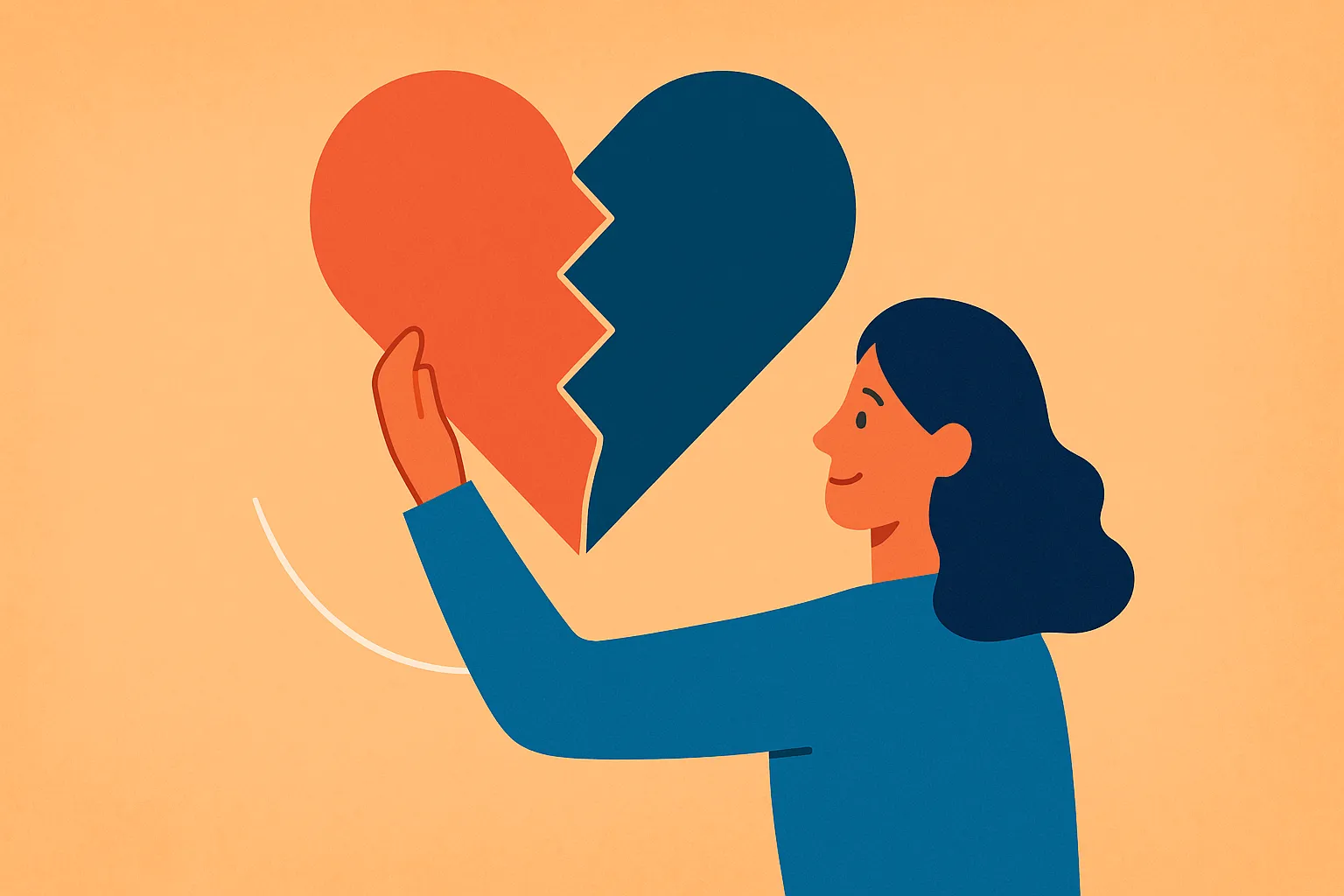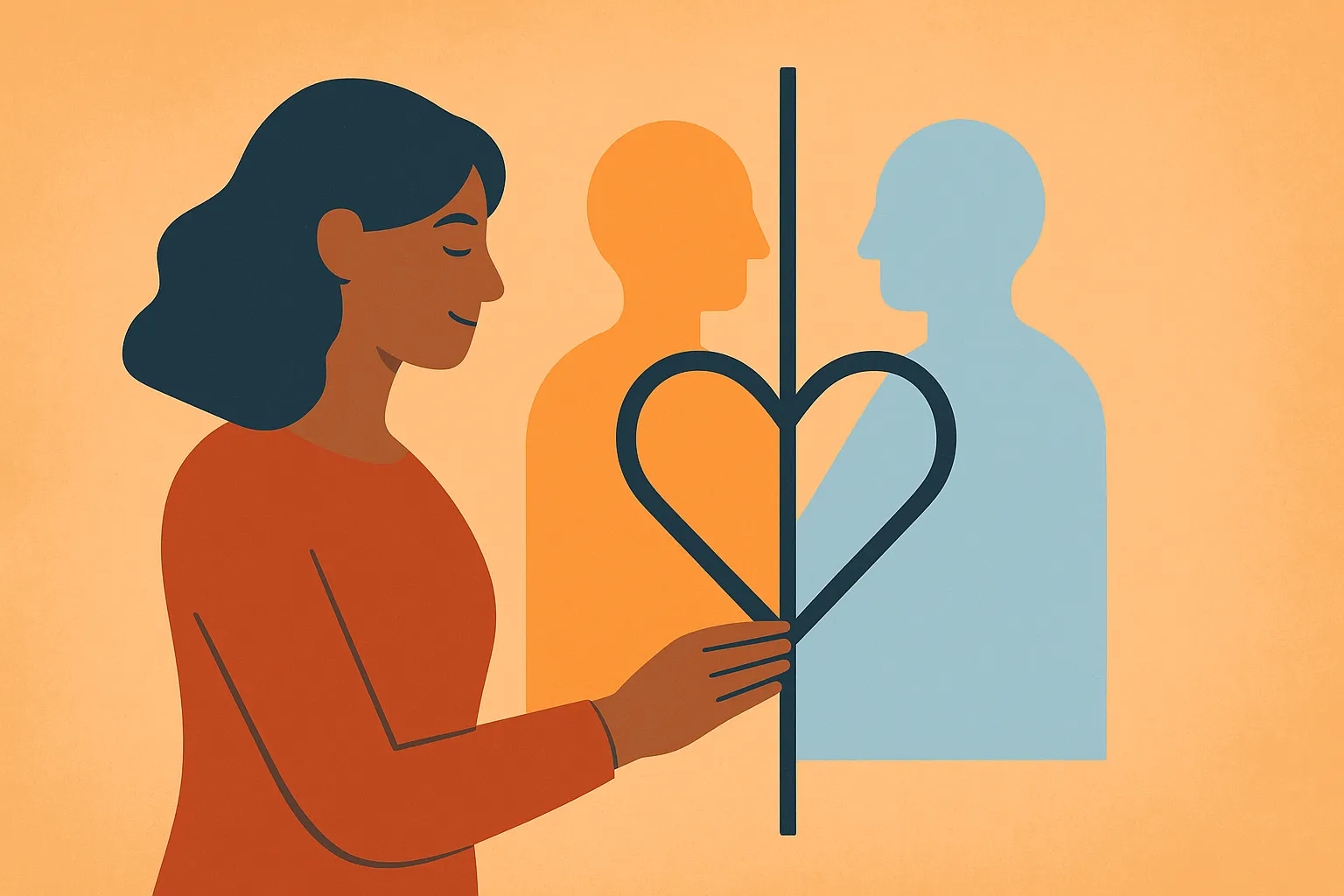
Three months after my relationship ended, crying into a bowl of cereal and frantically googling "am I taking too long to get over this?" I'd already gone through two phases of thinking I was "healed" – the angry phase where I deleted all our photos and felt empowered for exactly 12 days, and the "I'm totally fine" phase where I went on three rebound dates that made me feel worse than before.
My friends kept asking how I was doing, and I kept lying because I thought three months should have been enough time. I mean, we were only together for a year and a half – shouldn't I be over it by now? I watched my coworker bounce back from her breakup in what seemed like two weeks, posting happy selfies and already talking to someone new. Meanwhile, I was still having mini-breakdowns every time a song came on that reminded me of him.
The worst part? I started thinking something was fundamentally wrong with me. Why was everyone else moving on while I felt stuck in emotional quicksand? I began avoiding certain restaurants, taking different routes to work, and even switched grocery stores – all because I was terrified of running into him and having another emotional meltdown in public.
It wasn't until I stumbled across some research about grief timelines that I realized I wasn't broken or weak. I was just human, dealing with one of life's most universal experiences in my own completely normal way.
So if you're reading this while wondering why you're not "over it" yet, wondering if you're taking too long, or feeling frustrated with your own healing process – I get it. And more importantly, there's nothing wrong with you.
The Problem: We've Been Fed a Lie About Breakup Recovery
There's no universal timeline for getting over someone you loved. None. Zero. The idea that you should be "healed" in a specific timeframe is one of the most damaging myths we tell ourselves about heartbreak.
"Healing isn't linear, and it definitely isn't fast."
And here's the kicker: that timeline varies wildly based on dozens of factors that have nothing to do with your emotional strength or character.
You know what makes it worse? Our culture treats emotional healing like a productivity challenge. We want measurable progress, clear milestones, and ideally a completion date we can mark on our calendar. But breakups don't work that way.
The real problem isn't that you're taking "too long" – it's that you're judging your natural healing process against an impossible standard. You're essentially trying to rush one of the most complex emotional experiences humans can have, and then beating yourself up when it doesn't happen on schedule.
Here's Some Good News
Your healing timeline isn't broken—it's just yours.
I know that's probably not what you wanted to hear. You wanted me to say "6 weeks and you'll be golden!" But actually understanding why your recovery feels so unpredictable is way more powerful than any false promise.
See, when you stop judging your timeline and start working with it, everything changes. Instead of fighting your feelings, you can actually help them move through you faster.
The people who heal most effectively aren't the ones who follow some arbitrary schedule. They're the ones who learn to navigate their specific situation with intention.
What actually works is a personalized approach that honors your unique circumstances.
The 4 Phases of Actually Getting Over Someone (And How Long Each Really Takes)
Phase 1: Honest Assessment (Understanding YOUR Timeline)
The truth is: your healing timeline depends entirely on factors unique to your situation. Before wondering "how much longer will this take," you need to understand what's actually influencing your recovery speed.
Your relationship depth matters because deeper connections require more neural rewiring. A three-month fling hits differently than a five-year partnership where you planned a future together. Don't let anyone minimize your experience because "it wasn't that long."
Your attachment style plays a huge role in your timeline. If you're anxiously attached, you might cycle through intense emotions for months. If you're avoidantly attached, you might feel numb initially then get hit with delayed grief 6+ months later.
🔑 Key factors that influence your timeline:
- How the breakup happened (Did you see it coming or were you completely blindsided?)
- Whether you had closure conversations (Were you able to talk things through or not?)
- Your support system strength (Do you have close friends and family to lean on?)
- Other life stressors happening simultaneously (Are you also dealing with work stress, family issues, or health problems?)
- Your previous breakup experiences (Is this your first major heartbreak or have you been through this before?)
Why this matters for your timeline: People with multiple complicating factors (blindsided + no closure + weak support system) typically take 2-3x longer than those with favorable conditions. Understanding your situation helps set realistic expectations instead of beating yourself up for not healing "fast enough."
🤔 Want to know if your situation means your timeline will be shorter or longer than average? Click here to get an AI advisor to find out what your specific situation typically means for recovery time!
Phase 2: Emotional Waves Management (The Active Healing)
Healing doesn't happen in a straight line. It comes in waves—sometimes you'll feel great, then boom, you're crying in the grocery store because they're playing "your song."
Successful people always prepare for the waves instead of being surprised by them.
🌊 Here are the things you need to be prepared:
- Morning waves (emotions hit hardest when you first wake up and realize they’re gone)
- Trigger waves (specific songs, places, or memories remind you of them)
- Progress waves (feeling guilty for having a good day cause emotions hit)
- Anniversary waves (monthly or yearly relationship milestones hit you even harder)
The key is understanding that waves don't mean you're going backward—they're part of moving forward.
❗️Avoid this trap: Thinking that one bad day means you're "back to square one." Healing spirals upward, but it's still a spiral.
🤔 Want to know the specific techniques that actually help you move through waves faster instead of just enduring them? Click here to get proven strategies that speed up your healing!
Phase 3: Identity Reconstruction (The Real Work)
Here's what most people miss: The hardest part isn't missing your ex. It's figuring out who you are without them.
In long-term relationships, your identity becomes intertwined with your partner's. You develop shared routines, inside jokes, future plans. When that ends, you're not just losing a person—you're losing a version of yourself.
Where this usually goes wrong: people try to "get back to who they were before." But you can't go backward. You have to build forward.
🚧 The reconstruction process of yourself includes:
- Rediscovering your individual preferences - What shows, food, activities, do YOU like?
- Rebuilding social connections that might have faded -Texting friends you stopped seeing as much, joining activities you used to love, saying yes to invitations again
- Creating new routines and traditions - New coffee shop for Sunday mornings, different route to work, fresh weekend rituals that are just yours
- Exploring parts of yourself that were dormant - Hobbies they didn't care about, career dreams you put on hold, personality traits you toned down for them
This phase often takes the longest because it's essentially personality development work. But it's also where the real growth happens.
🤔 Not sure which reconstruction approach fits your personality and situation best? Click here to find out what rebuilding strategy works for your specific type!
Phase 4: Integration and Moving Forward (The New Normal)
You'll know you're in this phase when thinking about your ex doesn't derail your entire day. It might still sting, but it doesn't control you.
The psychology behind this shift is that your brain has finally created new neural pathways. You've essentially rewired yourself around the reality of your new life.
✨ Signs you're integrating:
- You can genuinely wish them well (even if you don't want them back)
- You feel excited about your own future
- You've learned specific lessons you can articulate
- You're not constantly comparing new people to your ex
Common mistake: Panicking when memories surface and thinking it means you're "back to square one." Healing doesn't mean amnesia—it means acceptance.
I Know You Might be Thinking
"This all sounds great, but what if I'm taking too long? What if everyone thinks I should be over it by now?"
These concerns are so normal. Society puts intense pressure on people to "move on" quickly, especially after breakups that others perceive as "not that serious."
But here's the thing: Other people's opinions about your healing timeline are absolutely irrelevant. They didn't live your relationship. They don't know your attachment history. They haven't been inside your heart.
The only timeline that matters is yours.
If you're worried about taking "too long," consider this: Would you rush someone's recovery from a physical injury? Would you tell someone with a broken leg to "just walk it off" after two weeks?
Your heart deserves the same respect.
That said, if you're feeling stuck or like you're cycling through the same painful thoughts repeatedly, that's where personalized guidance becomes invaluable. Sometimes we need an outside perspective to see our own patterns clearly.
Your Next Steps
Stop trying to graduate from your breakup. The pressure to be "over it" by a certain date is actually slowing down your healing.
Instead of asking "How much longer will this take?" start asking "What do I need right now?" Some days that might be letting yourself cry. Other days it might be going out with friends. Some days it might be staying home and binge-watching something completely unrelated to romance.
The real timeline question isn't "When will I be over this?" It's "How can I be gentle with myself while this process unfolds naturally?"


